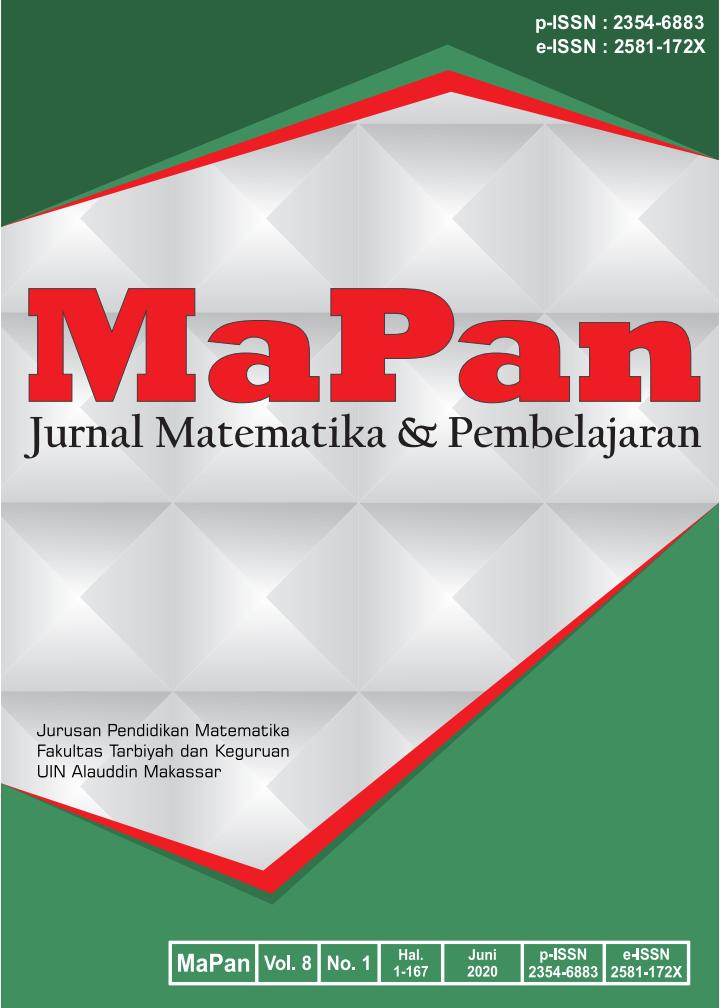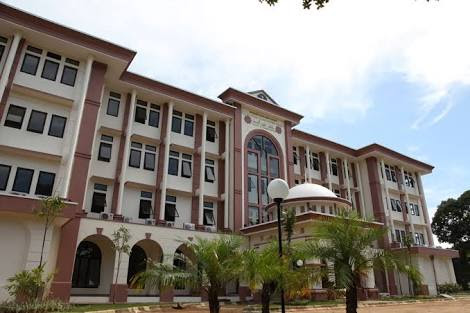ADVERSITY QUOTIENT AND RESILIENCE IN MATHEMATICAL PROOF PROBLEM-SOLVING ABILITY
Abstract
Abstract:
Various mathematical abilities require a high level of struggle to be achieved, one of which is the ability to solve mathematical proof problems. Several factors are also associated with this ability, including adversity quotient and resilience. This research aimed to look at the effect of adversity quotient and resilience on the mathematical proof problem-solving ability. This research used a quantitative approach with a correlational method. The sample in this study were 31 students randomly selected from all students of the Mathematics Education Study Program at Universitas Sulawesi Barat who programmed Abstract Algebra course in the academic year of 2019/2020, amounting to 71 students. The analysis technique used is multiple linear regressions. The results of hypothesis testing indicate that adversity quotient and resilience affect the mathematical proof problem-solving ability positively both individually and simultaneously.
Abstrak:
Berbagai kemampuan matematis memerlukan daya juang tinggi untuk berhasil dicapai, salah satunya kemampuan pemecahan masalah pembuktian matematis. Beberapa faktor pun dikaitkan dengan kemampuan tersebut, antara lain adversity quotient dan resiliensi. Penelitian ini bertujuan untuk melihat pengaruh adversity quotient dan resiliensi terhadap kemampuan pemecahan masalah pembuktian matematis. Penelitian ini menggunakan pendekatan kuantitatif dengan metode korelasional. Sampel pada penelitian ini sebanyak 31 mahasiswa yang dipilih secara acak dari seluruh mahasiswa Program Studi Pendidikan Matematika Universitas Sulawesi Barat yang memprogramkan mata kuliah Struktur Aljabar tahun akademik 2019/2020 yang berjumlah 71 mahasiswa. Teknik analisis yang digunakan adalah regresi linear berganda. Hasil pengujian hipotesis menunjukkan bahwa adversity quotient dan resiliensi berpengaruh positif terhadap kemampuan pemecahan masalah pembuktian matematis baik secara sendiri-sendiri maupun secara simultan.
Downloads
References
Abdussakir, A. (2014). Proses berpikir mahasiswa dalam menyusun bukti matematis dengan strategi semantik. Journal of Science, Mathematics, and Vocational Education, 2(3), 132-140. http://doi.org/10.17977/jps. v2i3.4506.
Aljaberi, N. M. (2015). University students' learning styles and their ability to solve mathematical problems. International Journal of Business and Social Science, 6(4), 152-165. Retrieved from http://ijbssnet.com/journal /index/3132.
Amalia, S. R., & Widodo, A. N. A. (2018). Analisis kemampuan pemecahan masalah mahasiswa melalui model PBL berbasis etnomatematika ditinjau dari kepribadian topologi hippocrates dan galenus tipe cholearis dan phlegmantis. Aksioma: Jurnal Matematika dan Pendidikan Matematika, 9(1), 1-10 http://doi.org/10.26877/aks.v9i1.2467.
Arvanitakis, J., & Hornsby, D. (2016). Universities, the citizen scholar and the future of higher education. Springer.
Balacheff, N. (2010). Bridging knowing and proving in mathematics: a didactical perspective. In Explanation and proof in mathematics. Springer, Boston, MA. 115-135. https://doi.org/10.1007/978-1-4419-0576-5_9.
Basturk, S. (2010). First‐year secondary school mathematics students’ conceptions of mathematical proofs and proving. Educational Studies, 36(3), 283-298. https://doi.org/10.1080/03055690903424964.
CadwalladerOlsker, T. (2011). What do we mean by mathematical proof?. Journal of Humanistic Mathematics, 1(1), 33-60. https://doi.org/10.5642/ jhummath.201101.04.
Dilla, S. C., Hidayat, W., & Rohaeti, E. E. (2018). Faktor gender dan resiliensi dalam pencapaian kemampuan berpikir kreatif matematis siswa SMA. Journal of Medives: Journal of Mathematics Education IKIP Veteran Semarang 2(1), 129-136. https://doi.org/10.31331/medives.v2i1.553.
Ersoy, E. (2016). Problem solving and its teaching in mathematics. The Online Journal of New Horizons in Education, 6(2), 79-87. Retrieved from https:// www.tojned.net/journals/tojned/articles/v06i02/v06i02-11.pdf.
Gay, L. R. dan Diehl, PL (1992), Research methods for business and management, New York: MacMillan Publishing Company.
Gurat, M. G. (2018). Mathematical problem-solving strategies among student teachers. Journal on Efficiency and Responsibility in Education and Science, 11(3), 53-64. https://doi.org/10.7160/eriesj.2018.110302.
Hanna, G., & Barbeau, E. (2010). Proofs as bearers of mathematical knowledge. in Explanation and Proof in Mathematics: Philosophical and Educational Perspectives. 85-99. https://doi.org/10.1007/978-1-4419-0576-5.
Hasan, B. (2016). Proses berpikir mahasiswa dalam mengkonstruksi bukti menggunakan induksi matematika berdasarkan teori pemerosesan informasi. APOTEMA: Jurnal Program Studi Pendidikan Matematika, 2(1), 33-40. Retrieved from http://www.jurnal.stkippgri-bkl.ac.id/index.php /APM/article/view/304.
Hastuti, T. D., & Sari, S. (2018). Student profile with high adversity quotient in math learning. JPhCS, 983(1), http://doi.org/10.1088/1742-6596/983/ 1/012131.
Herutomo, R. A. (2019). Kesalahan mahasiswa dalam pembuktian matematik. Jurnal Didaktik Matematika, 6(1), 53-67. https://doi.org/10.24815/jdm. v6i1.13262.
Indarwati, D., Wahyudi, W., & Ratu, N. (2014). Peningkatan kemampuan pemecahan masalah matematika melalui penerapan problem based learning untuk siswa kelas V SD. Satya Widya, 30(1), 17-27. https:// doi.org/10.24246/j.sw.2014.v30.i1.p17-27.
Lesseig, K., Hine, G., Na, G. S., & Boardman, K. (2019). Perceptions on proof and the teaching of proof: A comparison across preservice secondary teachers in Australia, USA and Korea. Mathematics Education Research Journal, 31(4), 393-418. https://doi.org/10.1007/s13394-019-00260-7.
Liljedahl, P., Santos-Trigo, M., Malaspina, U., & Bruder, R. (2016). Problem solving in mathematics education. In Problem Solving in Mathematics Education. Springer, Cham. 1-39. https://doi.org/10.1007/978-3-319-40730-2.
Maharani, S., & Bernard, M. (2018). Analisis hubungan resiliensi matematik terhadap kemampuan pemecahan masalah siswa pada materi lingkaran. JPMI (Jurnal Pembelajaran Matematika Inovatif), 1(5), 819-826. http://doi.org/10.22460/jpmi.v1i5.p819-826.
Malik, I., Mulyono, M., & Mariani, S. (2019). Ability in mathematics problem solving based on adversity quotient. Jurnal Profesi Keguruan, 5(1), 90-95. https://doi.org/10.7290/jpk.v5i1.18878.
Mardika, F., & Insani, S. U. (2017). Adversity quotient and students’ problem solving skill in mathematics. 4th ICRIEMS Proceedings. Published by The Faculty of Mathematics and Natural Sciences Yogyakarta State University.
Matore, M. E. E. M., Khairani, A. Z., & Razak, N. A. (2015). The influence of aq on the academic achievement among malaysian polytechnic students. International Education Studies, 8(6), 69-74. http://doi.org/10.5539/ies. v8n6p69.
Mukmin, M. I., & Fa'ani, A. M. (2020). Identification of students’ misconceptions in proving onto and one-to-one function in abstract algebra using certainty response index. International Journal on Teaching and Learning Mathematics, 2(1), 1. https://doi.org/10.18860/ijtlm. v2i1.8582.
Muliawati, N. E. (2018). Proses berpikir mahasiswa dalam memecahkan masalah pembuktian grup berdasarkan langkah polya. JP2M (Jurnal Pendidikan dan Pembelajaran Matematika), 4(2), 32-42. http://doi.org/10. 29100/jp2m.v4i2.954.
Mulyati, T. (2011). Kemampuan pemecahan masalah matematis siswa sekolah dasar. Jurnal Pendidikan Dasar. 3(2). 35-46. https://doi.org/10.17509/eh. v3i2.2807.
Murphey, D., Barry, M., & Vaughn, B. (2013). Positive mental health: resilience. Adolescent Health Highlight, 3, 1-6. Retrieved from https://www. childtrends.org/publications/positive-mental-health-resilience.
Mustafia, I. D., & Widodo, S. A. (2018). Problem solving skill: effectiveness on think pair share with comic. International Journal on Teaching and Learning Mathematics, 1(2), 76-83. http://doi.org/10.18860/ijtlm.v1i2. 7181.
Ningsih, S. C. (2017). Meningkatkan kemampuan pemecahan masalah mahasiswa pendidikan matematika UPY pada mata kuliah teori bilangan melalui model pembelajaran creative problem solving (CPS). Jurnal Mercumatika. 1(2). 132-138. https://doi.org/10.26486/mercumatika. v1i2.212.
Novianti, E., & Kurniadi, Y. (2016). Pendekatan Eksploratif untuk meningkatkan kemampuan pemecahan masalah matematis dan motivasi belajar siswa. Jurnal Pena Ilmiah, 1(1), 401-410. https://doi.org/10.23819/ pi.v1i1.3046.
Nurrahmah, A., & Karim, A. (2018). Analisis kemampuan pembuktian matematis pada matakuliah teori bilangan. Jurnal eDuMath, 4(2), 21-29. https://doi.org/10.26638/je.753.2064.
Obersteiner, A., Reiss, K., & Heinze, A. (2018). Psychological theories in mathematics education. Journal für Mathematik-Didaktik, 39, 1-6. https:// doi.org/10.1007/s13138-018-0134-3.
Octaria, D., & Sari, E. F. P. (2017). Kemampuan pemecahan masalah matematis melalui problem based learning. Jurnal Dosen Universitas PGRI Palembang, 1(9), 1-14. https://jurnal.univpgri-palembang.ac.id/index. php/prosiding/article/view/1688.
Oliveros, J. C. (2014). Adversity quotient and problem-solving skills in advanced algebra. JPAIR Multidisciplinary Research, 17(1). http://doi.org /10.7719/jpair.v17il.282.
Ozdemir, E., & Ovez, F. T. D. (2012). A research on proof perceptions and attitudes towards proof and proving: some implications for elementary mathematics prospective teachers. Procedia-Social and Behavioral Sciences, 46, 2121-2125. https://doi.org/10.1016/j.sbspro.2012.05.439.
Parvathy, U., & Praseeda, M. (2014). Relationship between adversity quotient and academic problems among student teachers. Journal of Humanities and Social Science, 19(11), 23-26. Retrieved from https://pdfs. semanticscholar.org/3dfb/f7c8ff92cf1e84fc8c79503cf8fbd4721a79.pdf.
Qin, L., Zhou, Y., & Tanu, W. T. (2019). The Analysis of mathematics adversity quotient of left behind junior high school students in rural areas. Open Journal of Social Sciences, 7(10), 331. https://doi.org/10.4236/ jss.2019.710028.
Reivich, K., & Shatte, A. (2002). The resilience factor: 7 essential skills for overcoming life's inevitable obstacles. Broadway books.
Rocha, H. (2019). Mathematical proof: from mathematics to school mathematics. Philosophical Transactions of the Royal Society A, 377 (2140), 20180045. http://doi.org/10.1098/rsta.2018.0045.
Rojas, L. F. (2015). Factors affecting academic resilience in middle school students: A case study. Gist: Education and Learning Research Journal, (11), 63-78. https://doi.org/10.26817/16925777.286.
Roscoe, J. T. (1975). Fundamental research statistics for the behavioral sciences (Internasional Series in Decision Processes). Holt, Rinehart & Winston.
Rostika, D., & Junita, H. (2017). Peningkatan kemampuan pemecahan masalah siswa SD dalam pembelajaran matematika dengan model diskursus multy representation (DMR). EduHumaniora| Jurnal Pendidikan Dasar Kampus Cibiru, 9(1), 35-46. https://doi.org/10.17509/eh.v9i1.6176.
Rukmana, I., Hasbi, M., & Paloloang, B. (2016). Hubungan adversity quotient dengan hasil belajar matematika siswa kelas XI SMA Negeri Model Terpadu Madani Palu. Jurnal Elektronik Pendidikan Matematika Tadulako, 3(3). Retrieved from http://jurnal.untad.ac.id/jurnal/index. php/JEPMT/article/view/7220.
Star, J. & Rittle-Johnson, B. (2016). Toward an educational psychology of mathematics education. In L. Corno & E. Anderman (Eds.) Handbook of Educational Psychology. Third edition. American Psychological Association. New York, United States: Routledge.
Stefanowicz, A., Kyle, J., & Grove, M. (2014). Proofs and mathematical reasoning. University of Birmingham.
Stoltz, P. G. (2004). Adversity quotient: mengubah hambatan menjadi peluang. Jakarta: Gramedia Widiasarana Indonesia.
Suhendri, H. (2018). The role of resilience (adversity intelligence) and creativity in mathematics learning. Unnes Journal of Mathematics Education, 7(2), 90-94. https://doi.org/10.15294/ujme.v7i2.25367.
Supardi, U. S. (2014). Pengembangan Instrumen Pengukuran Ketahanmalangan (Kecerdasan Adversitas) Siswa. In Prosiding Seminar Nasional Evaluasi Pendidikan Program Pacsasarjana UNJ. 978-608. Jakarta.
Zanthy, L. S. (2018). Kontribusi resiliensi matematis terhadap kemampuan akademik mahasiswa pada mata kuliah statistika matematika. Mosharafa: Jurnal Pendidikan Matematika, 7(1), 85-94. https://doi.org/10.31980/ mosharafa.v7i1.344.
Copyright (c) 2020 Fauziah Hakim, Murtafiah Murtafiah

This work is licensed under a Creative Commons Attribution 4.0 International License.


